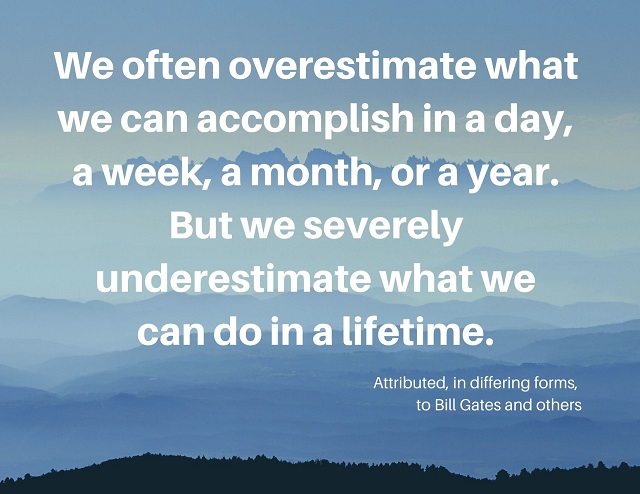
In this productivity-oriented culture, goal setting is expected for nearly everything we do. But many writers struggle with setting goals around a writing practice and then lose their way if they don't meet their targets.
A typical goal-oriented question from writers is “Should I write every day?” When I posed that question to a famous published author, she responded without hesitation: “Absolutely.” For years afterward, this whorled in my own writer brain and I couldn’t be open to any other answer. This woman was published, after all; she had to know. And since I wasn’t putting words down in every 24-hour time block, I couldn’t possibly call myself a writer.
I now know how absurd it was to bestow this author with unearned power over MY writing practice. Uncovering the fallacy of her guidance cost me years of writing time; it took decades of trial-and-error to develop a writing practice that allowed for my ever-changing schedule, still gave a sense of momentum, and didn’t leave me with guilt when I wasn’t writing. This required learning to set goals that were right for me.
No one should impose their way of working upon another writer; you’re the only one with the authority to direct and dictate your writing practice and process. So I hope these five things I’ve learned can help you set writing goals that are right for you.
1. Different Methods for Different Writers
There’s no single “correct” way to set a writing goal, but there are two basic methods:
Method 1: a goal paced for the purpose of completing a project, i.e. project-oriented
To feel a project is progressing, some writers need to see climbing word counts. Indeed, daily or weekly word count goals are the goals writers most commonly set. Another writer might aim for finishing one short story a month regardless of length. Both are project-oriented writing goals; the primary emphasis is the amount of production to complete the project.
Method 2: a goal that works within the confines of available time, i.e. time-focused
A time-focused goal, such as writing for fifteen minutes every morning or thirty minutes during your lunch break, might work better for a busy mom or a writer with a full-time job.
Look at your current situation to decide whether a project-oriented goal or a time-focused goal would work best for you. Whichever goal-setting tactic you use now, remain open to changing it (see #5).
2. Keep It Visible
Setting the goal is the easy part. Remembering to do it is another, especially if you’re caught up in a frenzy of responsibilities.
So write your goal on an index card or type it out large. Then put it on your bathroom mirror, stick it to your computer monitor or beside the coffee pot—anywhere you’ll see it every day even if your goal isn’t a daily one.
3. Make It Attainable and Sustainable
At writing retreats, I have to check in with new attendees who declare they’ll write for four or five hours a day when, back home, they hadn’t been writing for even one hour a day—or at all. Make sure your goal is reasonable and attainable, and know that you might need to build up to it over time. There’s value in starting small to create momentum.
Your goal should be sustainable, too. If you meet your word-count goal seven consecutive days but find it so grueling that you can’t continue doing it, then what’s the use in having that as your goal? Don’t set yourself up for failure. Your goals should be achievable but also something you can comfortably sustain, at least for the duration of a given writing project.
4. Have a Recovery Plan
Sometimes we simply cannot or do not write—for more reasons than there’s space here to list. When fallow times happen, they can seem devastating to our goals. But since they’re a natural and expected part of the writing process, doesn’t it make sense to create a Recovery Plan before we actually need one?

Productivity philosopher and Start Finishing author Charlie Gilkey asserts that we need a mix of creation, connection, and consumption to do our best work. This principle holds keys for resuming an interrupted writing practice and provides a blueprint for an effective Writer’s Recovery Plan.
Let’s apply Gilkey’s principle to the writer’s life:
Creation represents our focused writing time, as well as any other creative activity that refreshes us. If you’re stuck or need to ease back toward your goals, try some new or different act of creation, especially if writing is your primary or only creative activity. Drawing, painting, jewelry-making, sewing, woodworking, gardening, model-making—the possibilities are endless and the crossover effect on your writing can be astounding. Don’t take my word for it though. Try it.
Consumption refers to acquiring knowledge about our writing craft. Both passive and active learning can motivate us toward our writing goals. Opening a great novel or watching a classic movie always inspires me. Writing workshops and conferences provide new knowledge that I’m driven to incorporate into my writing when I return. When I can’t leave home, I look to my bookshelf or local library for a good book on writing. Seek out and build into your Recovery Plan opportunities to learn more about our craft.
I saved Connection for last since it takes a bit more explanation but can be the most effective means to recover from a non-writing period. Gilkey’s definition of connection addresses being in relationship with others, both online and in person. Mine, too, includes connecting with family and friends, as well as other writers. But I've expanded on that definition to incorporate connections that, when accessible to us, can be vital for writers: connections with nature, ourselves (physically and spiritually), and perhaps most importantly, an ongoing connection or a re-connection to our purpose and passion for writing. These could translate into a Writer’s Recovery Plan in the following ways.
Being in, and connecting with, nature can provide quiet time to get the chatter of others out of your head, to calm your mind, and to contemplate your own ideas. So go sit under a tree or stare at a lake.
Physical activity, especially walking but also playing with children, yoga, running, and other types of exercise have a positive effect on creativity and ideation. Connect with your body through movement to enhance your creative thinking.
Spirituality, in the context of this article, has no religious connotation and refers to a search for meaning and understanding. Conveniently, writing and other forms of creativity are some of the best tools for understanding ourselves as well as the complex, ambiguous, beautiful world we live in. The interrelationship between spirituality and creativity and their effects on the human potential are just beginning to be studied. But clearly, tools for spiritual growth such as meditation, prayer, yoga, breathwork, even listening to podcasts on personal development can complement and enhance our growth as writers and strengthen our connections to ourselves and our creativity. Consider experimenting with a few spiritual tools to see what might work for you. Then, if they’re not already part of your routine, include them in your Recovery Plan.
Finally, connection includes reminding ourselves of the “why” for our writing. Every writer has his/her own motivations for writing and being a writer. But sometimes in the throes of striving, we forget what lies at the heart of our purpose and passion for it. When I’m discouraged, confused, or lack motivation to aim for my writing goals, I pull out a journal and write about my writing. To be clear, this isn’t doing the work of the project-in-progress, but rather an exploration in my heart and mind of why I want to do the project in the first place and, on the larger scale, why I want/need to write. It’s an invaluable reminder of why it’s worth it and always directs me back to the work itself. Pull out your journal and write about your writing to connect and reconnect with your project, and with your purpose and passion for writing.

Create a Writer’s Recovery Plan for getting back to your writing practice, no matter the reason for getting away from it. A Recovery Plan can reorient you to your goals and ease you back into your practice with less anxiety and more grace.
5. Review, Adjust, Reflect
Set aside time to periodically review how you’re doing toward your goals. Your situation might change so that your original project goal no longer works. Or the project might evolve into something you didn’t anticipate, so the goal might require adjustment.
Realize, too, that the goal for one project might not be relevant for the next one. Writing 150 words a day might seem reasonable for a writer focusing on short stories, but that pace may feel too slow if s/he shifts to writing a novel. Be willing to experiment with your goal-setting methods and levels.
Your goals review could occur weekly, monthly, or quarterly. The intention isn’t to beat yourself up if you haven’t matched the goal but to shine light on whether you need to make adjustments—up or down. Look carefully at why you’ve exceeded the goal or fallen short, and adjust as needed. End-of-project evaluations are helpful too as they provide perspective for future goal setting.
Finally, don’t forget to reflect; this might seem like the same thing as “review,” but it isn’t. Reflection is a long-range look at your overall writing practice rather than a focus on immediate or current projects. Reflect on what you’ve learned over time about your writing goals so you can continue to get better at setting and meeting them. Carry forward lessons learned and any new techniques you’ve developed.
We sometimes forget to revel in our successes, so also reflect on your achievements. Despite romanticized notions of the writer’s life, writing isn’t easy or glamorous so it’s important to recognize how far you’ve come and to acknowledge the heart and the work you’ve put into those words on the page. You deserve to celebrate what you’ve done.
Bonus Tip: Devotion Over Discipline
Rather than imposing discipline around your writing practice, cultivate a devotion for it. Gentle, consistent love and attention might take you farther than rigid, scheduled structure.
I’ll leave you with one of my favorite quotes: “We often overestimate what we can accomplish in a day, a week, a month, or a year. But we severely underestimate what we can do in a lifetime.” This offers a realistic perspective enlivened by limitless possibilities—both of which can carry us forward and upward as we set, reach for, and attain our writing goals.


